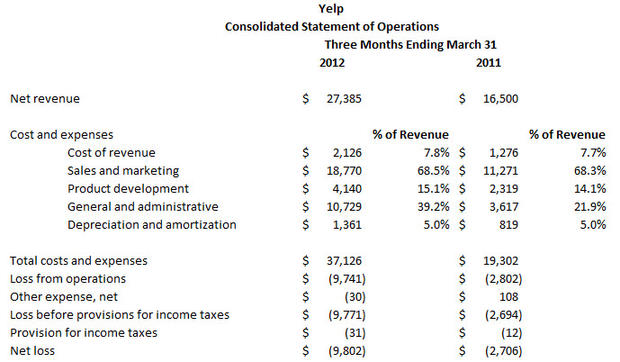Yelp losses widen on higher employee costs

(MoneyWatch) COMMENTARY Yelp announced the results of its 2012 first quarter today, increasing revenue by two-thirds year over year but tripling its loss. However, shares were up almost 3 percent after hours as the company projected 2012 revenue that exceeded analyst average expectations.
Increased costs caused the growth of the loss, as would make sense. But even with an emphasis on growing the business, the company's expenses did not increase equally across the board. Instead, the increased costs were due to expanded stock-based employee compensation.
A quick look at the consolidated statement of operations in the earnings release helps show why. Here's a version, amended by MoneyWatch to show categories of expenses as percentages of net revenue:

Sales and marketing costs remained a constant though large percentage of revenue. Yelp has said in filings with the Securities and Exchange Commission that it has "determined to forgo the achievement of near-term profitability in return for growth." Sales and marketing expenses are clearly a major driver of losses, with the market waiting to see whether Yelp, like Groupon (GRPN), can eventually develop enough of a retained base of advertisers to reduce the marketing spend and eventually gain profitability.
(In the fourth quarter of 2011, the company said that 67 percent of its advertisers had previously advertised at some time during the prior 12 month period. But as digital advertising expert and consultant Rocky Agrawal recently told MoneyWatch, Yelp uses a subscription business model in which companies may continue advertising because "no one pays attention to the bill.")
But the sales and marketing expenses have remained proportional. What really took a leap was the general and administrative category, which is effectively overhead. It went from about 22 percent of revenue to more than 39 percent.
Stock-based compensation seems to be the largest factor, according to the numbers in Yelp's earnings release:

Without that addition to general and administrative expenses, the category would have been a far more modest 17 percent of revenue. Overall, stock-based compensation increased by nearly 600 percent year over year.
Erik ShermanErik Sherman is a widely published writer and editor who also does select ghosting and corporate work. The views expressed in this column belong to Sherman and do not represent the views of CBS Interactive. Follow him on Twitter at @ErikSherman or on Facebook.
Twitter FacebookDisclaimer: The copyright of this article belongs to the original author. Reposting this article is solely for the purpose of information dissemination and does not constitute any investment advice. If there is any infringement, please contact us immediately. We will make corrections or deletions as necessary. Thank you.







